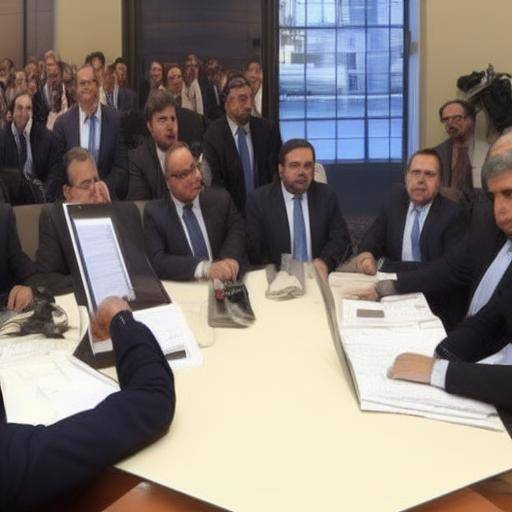
Investment represents a key tool for the growth, security and future of long-term family finance. In the context of a changing and challenging economy, informed and strategic financial decision-making can make the difference between stability and progress or uncertainty and limitation. In this article, we will thoroughly explore the impact of investment on family finance, from its historical importance to future trends and predictions, providing a comprehensive and practical vision for families seeking to secure their financial well-being over time.
Introduction
The vital importance of investment in family finance has been recognized throughout history. Today, in a globalized and changing economic environment, the ability to efficiently manage financial resources has become a determining factor in ensuring a prosperous and secure future. In this regard, understanding the impact of long-term investment is essential for families seeking to achieve their financial goals and ensure the economic stability of future generations.
In this article, we will explore in depth how investment influences property growth, financial security and future planning, providing a comprehensive analysis of their implications and benefits for family finance. From a historical perspective to current and future trends, we will address this issue in a comprehensive manner, offering practical insights and actionable advice for those seeking to optimize their long-term financial resources.
History and Background
The history of investment encompasses centuries of development, from the first forms of exchange to sophisticated contemporary financial markets. Over time, investment has been a fundamental pillar in the accumulation and preservation of wealth, playing a crucial role in the economic growth and well-being of families.
Evolution of Investment
- Antiquity: The first forms of investment focused on the exchange of goods and services. Ancient civilizations, such as Roman and Greek, already practiced wealth accumulation through property and trade.
- Age: The emergence of the guilds and trade associations marked a breakthrough in investment practices, with the use of contracts and the creation of commercial networks.
- Industrial Revolution: Industrialization brought with it an increase in investment opportunities, with the development of capital markets and the introduction of stocks and bonds.
- Twentieth and twenty-first century: Globalization and technology have transformed investment, with the creation of international financial markets, investment funds and digital tools that facilitate access to various investment options.
Detailed Analysis
Benefits of Family Finance Investment
- Patrimonial growth: Investment allows capital to grow over time, surpassing inflation and increasing family assets.
- Financial security: Investment diversification can provide a safety net against economic contingency, ensuring financial stability.
- Future Planning: Long-term investment facilitates planning for specific goals, such as children's education, housing or retirement.
Challenges and Risks
- Market volatility: Market fluctuations can affect the value of investments, which requires a well thought and diversified strategy.
- Inflation risks: Inflation can erode the purchasing power of investments if they are not properly managed.
- Education and Knowledge: Lack of financial knowledge can lead to inadequate investment decisions and loss of capital.
Comprehensive review
Best Practices for Family Investment
- Diversification: Distributing capital in different types of investments to mitigate risks.
- Continuous education: Stay informed about market trends and new investment opportunities.
- Professional advice: Consult with financial advisers to make informed and strategic decisions.
Comparative analysis
Compare different investment strategies can provide a clearer view of what is best suited for each family situation. For example, investment in real estate versus investment in stocks and bonds.
Practical Tips and Actions
- Establishing Clear Financial Targets: Define short, medium and long-term objectives to guide investment decisions.
- Create an Emergency Fund: Before investing, make sure you have an emergency fund to cover unforeseen.
- Review and Adjust regularly: Periodically evaluate the investment portfolio and make adjustments as necessary.
Industry Perspectives and Expert Reviews
Financial experts and market trends can provide valuable information on how to optimize family investments. We will interview experts and analyze current trends to provide an enriching vision.
Cases of Study and Applications in Real Life
We will examine detailed case studies to illustrate the practical application of family finance investment strategies. These cases will provide vivid examples of how investments can influence financial decisions and how they can be handled effectively.
Case Study 1: Investment in Education
A family invests in educational funds to ensure their children's university education. We will analyze how this decision has impacted your financial security and educational opportunities for your children.
Case Study 2: Real Estate Investment
Another family decides to diversify their investment by buying rental properties. We will explore how this strategy has generated passive income and increased its long-term assets.
Future Trends and Predictions
We will explore emerging trends and future predictions related to investment in family finance. We will identify potential challenges and opportunities that could influence investment decisions in the coming years.
Emerging trends
- Investment in Technology: Increased investment in technological startups and innovative companies.
- Sustainable investment: Increased interest in socially responsible and sustainable investments.
- Automation and Fintech: Use of financial technology to facilitate investment management.
Conclusions and FAQs
Conclusions
In short, the impact of investment on long-term family finances is significant and can make the difference in achieving financial goals, economic security and building a prosperous future. In understanding its historical importance, its current implications and future trends, families can make informed and strategic decisions to ensure a sound and stable financial path. With proper knowledge, conscious planning and the application of effective practices, investment can be a powerful tool to ensure family economic well-being over time.
Frequently asked questions
- What is the importance of heritage growth in family finance?
- Patrimonial growth allows families to increase their wealth over time, overcoming inflation and securing resources for the future.
- How to ensure long-term financial security for my family?
- Diversifying investments, maintaining an emergency fund and consulting with financial advisers.
- What investment strategies are best suited to plan a family's financial future?
- Investments in educational funds, real estate and retirement plans.
- What is the impact of investment on the education and well-being of children in the long term?
- It ensures resources for quality education and future opportunities, which contributes to the overall well-being of the family.
- What are the most common risks associated with long-term investment?
- Market volatility, inflation and lack of financial knowledge.
- How can I maximize the growth of my investments while guaranteeing an adequate level of financial security for my family?
- Diversifying investments, continually evolving on market trends and consulting with financial advisers.






















































